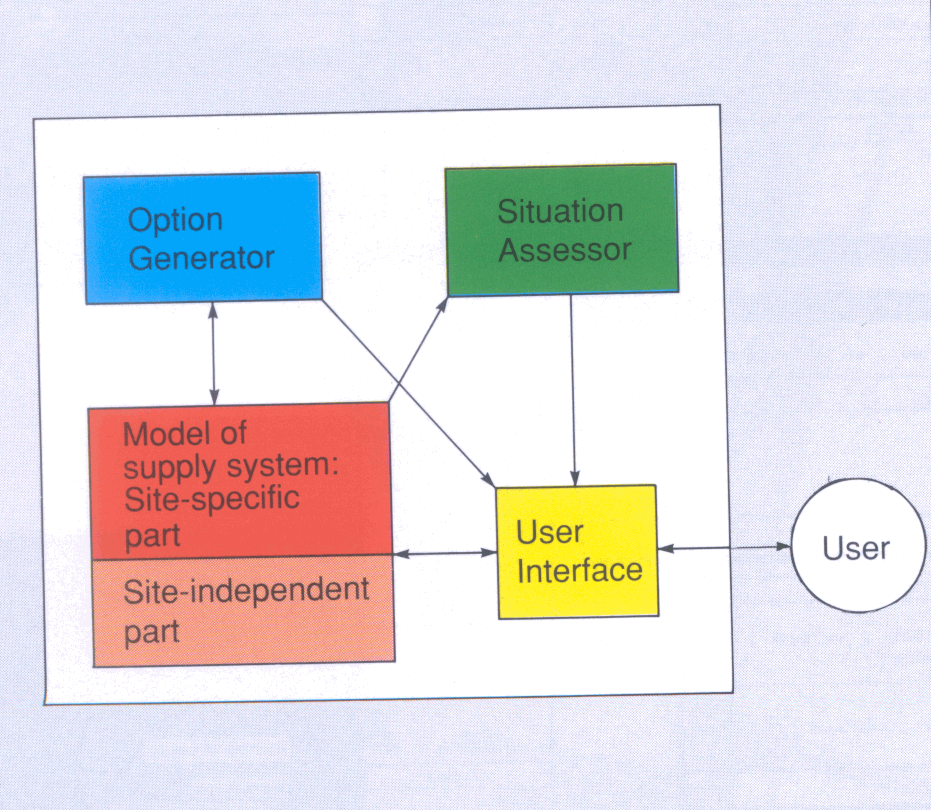

In 1989, work began on a project for a consortium of Water Authorities and Water Companies under the coordination of the Water Research Centre, Swindon. The aim was to develop a pilot knowledge-based system for assisting in the operations of water network management and control. The project was divided into four phases:
The Definition Phase was completed in December 1989. Two or more Informatics staff visited sites from each of the nine consortium members and conducted interviews with several members of staff. The interviews were a preliminary knowledge acquisition aimed at scoping the project: searching for common problems and opportunities for a knowledge-based system. A report was written and accepted by the consortium based on the findings of this phase. It identified three general classes of application which were found at the sites visited and which could benefit from a knowledge-based system (KBS) solution, namely assistance in dealing with non-routine abnormal conditions on the supply system, risk assessment and resource management. Furthermore, the Southern Water site at Otterbourne was chosen as the pilot site on account of the high quality of its experts and the typicality of its supply system and working methods.
In the Prototyping Phase, a period of intensive knowledge acquisition lasting some three months took place with two principal experts at Otterbourne. Again the interviews were conducted by two or three Informatics staff, recording what was said and afterwards typing up transcripts of the sessions. The transcripts were later analysed according to the precepts of systematic knowledge acquisition to identify objects - both material and conceptual - in the experts' view of the domain, the relations between objects and the kind of strategies and problem-solving methods used. The transcripts were used to create an intermediate representation of the domain in readiness for the system design and coding which followed. At this stage the knowledge acquisition was driven by a need to develop an understanding of the domain itself - how a water supply system operates - and of the place of the three applications within it.
When a suitable point had been reached, that is, when it was felt that enough knowledge had been acquired to allow a definition of the functionality of the very first version of the prototype, the building of the system began. An AI toolkit, GoldWorks II, was chosen for the purpose. It ran on a portable Compaq personal computer, which had the advantage that the software could be demonstrated to the experts in their own places of work. The design method adopted struck a balance between unstructured rapid prototyping and rigorous top-down requirements-based design, in that it took advantage of the debugging features and rapid development cycle of GoldWorks, but by means of a series of Design Notes assumptions were made explicit and the design modularised. The system comprised four components: a model of the water supply system, a situation assessor for reporting on the consequences of given courses of action, an option generator for suggesting actions to the user, and a graphical user interface.
The first working version of the prototype was taken to Otterbourne for feedback from the experts, who received it favourably. It was also demonstrated to the full consortium.
The prototype was then enhanced and extended in preparation for a period of trials and feedback with the consortium and the Southern Water experts.

The Knowledge-Based System (KBS) simulated the behaviour of important components of the supply system by using the model of the water supply network. Each state of the supply system was assessed by the Situation Assessor to note important events including deviations from normal behaviour, for example a reservoir with less water than expected, or breaking of constraints, for example using excessive power at peak times. The Option Generator suggested intelligent courses of action that the user could take to alleviate the effects of problems. These could then be simulated and evaluated by the KBS to show the user the consequences of the action on the supply system.
The User Interface presented to the user an easy-to-use graphical and textual representation of the state of the supply system and allowed the user to accept the system's suggestions of action or suggest their own.
The project achieved all its main objectives. Prototype versions of the system were received by the water companies involved; the first pilot system was delivered to Southern Water plc; the site-independent version was developed.
The two pilot systems were installed in the control rooms or operations offices at Southern Water and North-West Water, and the platform software was delivered to the consortium. In the extensive user trials and acceptance tests, the pilots were favourably received by their intended users. The platform could be customized to new areas at a much reduced cost compared with starting the development from scratch. The pay-off was therefore considerable. But this was not the only advantage: the Water Distribution Expert System could be adapted for application to electricity or gas networks, because many of the fundamental concepts were similar.
See also: